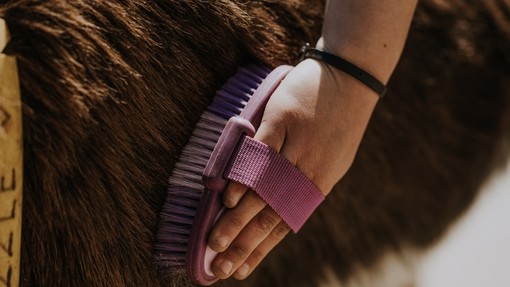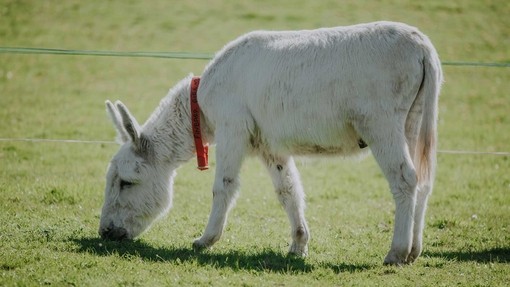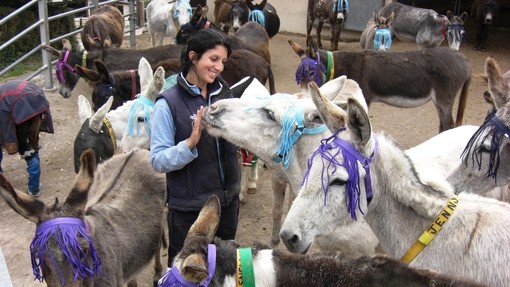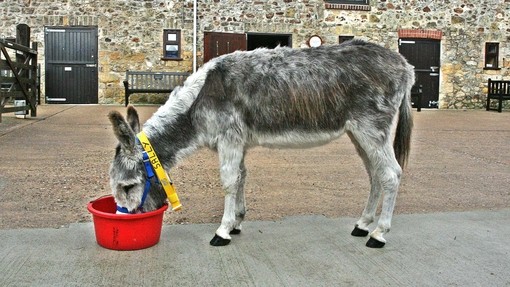What are the signs of heat stress in donkeys?
- raised respiratory (breathing) rate, heart rate, or temperature
- extreme sweating or no sweat at all
- flared nostrils
- lack of interest in moving or eating
- lying down more than normal
- glazed or sunken eyes
- no urine or very dark-coloured urine
- dark red or purple gums
- gums feel dry or tacky
Remember, your donkey may not show obvious behavioural signs of illness due to their stoic nature. Make sure you know your donkey’s normal body temperature, resting respiratory rate, and heart rate. This way, you will spot any changes.
If you suspect your donkey is overheating, move them out of the sun into the shade and start cold hosing with water straight away. Offer them fresh, clean water to drink. Call your vet as soon as possible. A donkey suffering from heat stress may need fluids.
How do I prevent my donkey from overheating?
Access to water
Donkeys require constant access to fresh, clean water at all times. Your donkey’s water requirement is the same as that of a similar-sized horse or pony.
Keep water containers such as troughs, automatic drinkers and buckets clean and topped up. Empty and clean out containers regularly but remember to refill them. Check natural water sources to make sure they are not contaminated. Check that access is safe and there is no risk of your donkey getting stuck or drowning. Offer water at regular intervals if your donkey’s access is restricted while being worked, as this will help prevent dehydration.
Some donkeys may refuse to drink very cold water, even in extreme heat. If so, allow the water to warm up in the sun, or add some hot water, to encourage normal drinking behaviour.
Donkeys have evolved to deal with thirst better than other equids. They can function for longer in a state of water deprivation than a horse or pony. However, they still feel thirsty and they still become hot and tired.
Access to shade
Provide shelter in your donkey’s paddock or enclosure. This will give shade from the sun and some relief from flies.
Make sure the shelter is big enough for all members of the herd to lie down at the same time. Choose the type of shelter based on herd size, budget, and typical weather patterns in your area. Avoid shelters with low or tin roofs or poorly ventilated buildings. These are likely to get hot during periods of extreme heat.
Try turning your donkey out at night or in the early morning and evening, rather than during the day. This will help reduce their exposure to the sun.
Protection from the sun
Donkeys with light-coloured coats often have less pigment in their skin. They may suffer from sunburn on exposed areas, such as the muzzle, nose, or ears. Skewbald, piebald and tricoloured donkeys may also be at increased risk of sunburn.
Apply high factor sunscreen to any exposed skin (not the entire body) when the UV index is moderate to high.
Use a full-face fly mask (including a nose guard) for extra UV protection. This is particularly useful if your donkey objects to you applying sunscreen. Introduce the mask carefully and gradually.
Clipping your donkey
Elderly donkeys or those suffering from PPID (also known as Equine Cushing’s disease) may have trouble shedding their coat in summer.
Clip your donkey during the hotter months if they have a long coat. This will help keep their body temperature down and make them more comfortable.
If the weather quickly turns cold again, provide a suitable rug for your donkey.
If your donkey has light skin or is prone to fly bite irritation, clip them with caution. Their skin will be more vulnerable to sunburn and flies after clipping. Please consult our Clipping your donkey advice and our Protecting donkeys from insects advice for more information.
How do I prevent my donkey from overheating when being worked?
Take extra care during hot weather if your donkey is ridden, driven, walked in-hand, or worked in any other way.
- Minimise unnecessary activity during the hottest part of the day.
- Choose shady areas to keep your donkey cool.
- Offer water as often as possible, at least every four hours.
- Avoid travelling if possible. Horseboxes can become very hot if poorly ventilated, or in slow-moving or stationary traffic. If you must travel, do so during the cooler hours of the day or at night.
- Sometimes donkeys that travel will refuse to drink. If so, try bringing water from home or adding peppermint cordial to the water.
What other measures can I take to keep my donkey cool?
Freeze an ice-cream tub of water with safe leaves, fruit, or vegetables inside to make a healthy ice lolly. See our advice on Tasty treats for more information. If you have a small herd rather than a pair of donkeys, freeze several smaller tubs. This way, each donkey gets to have a turn.
Set up a fan to keep your stabled donkey cool. Check that the noise does not bother them. Make sure the fan is not so close as to annoy your donkey or be a potential hazard.
Gently sponge-down or hose your donkey with cool water. Introduce both gradually and carefully. With the sponge, work from the neck down the body. With the hose, start gently on a front leg and work up the body if your donkey is tolerant.
Always be gentle with your donkey, especially when bathing their head. Avoid getting any water in their ears.




